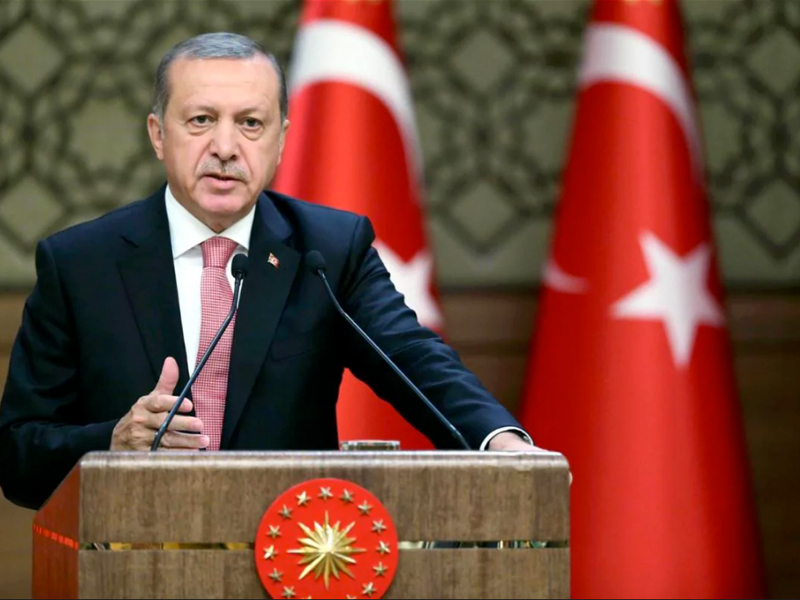By Volga Can Ozben and Richard Westra
Volga Can Ozben and Richard Westra maintain Turkey under Recep Tayyip Erdoğan as a poster case for the modern state of exception. This is a condition where constitutional and legal provisions in democracies, designed to temporarily empower rulers with absolute authority to defend the state in the face of perceived threats against it, are paradoxically deployed in perpetuity to abrogate both constitutionality and the rule of law in a drive to impose dictatorship beyond law itself.
It was the political theorist Carl Schmitt in his examination of conditions such as those which enabled Hitler’s instituting of Nazi totalitarianism in the ostensibly democratic German Weimar Republic who first touched on the notion of a state of exception. At the time of his writing, when constitutional government and the rule of law were at a nascent stage of development even within the European heartland of democracy, Schmitt essentially conceived of constitutionality as something “decided” by sovereign power which could also decide the “exceptions” to it.1 For Schmitt, democracy was thus saddled with an intractable ambivalence and his own personal turn to support Nazism demonstrated how he believed that problem is best resolved.
With the consolidation of constitutional democracy across Western Europe in the aftermath of the Second World War and the impetus to the spread of democracy throughout the “free world” this engendered, Schmitt’s ideas were largely relegated to specialised debate among a narrow coterie of academic experts in political philosophy. But, following the much dramatised events of 9/11, when a band composed mostly of Saudi Arabian national’s crashed hijacked planes into the World Trade Centre in New York,2 Schmitt’s thinking about democracy would work itself back into the forefront of policy circles. To be sure, significant segments of the global elite in Western democracies had never been completely committed to constitutionality and due process of law and had supported piecemeal legislation promulgated under the political radar to chip away at it. However 9/11 would open the floodgates for what effectively constitutes a “war on liberty” within what ostensibly were the world’s staunchest democracies.3
Quite simply, invoking the state of exception within even those states where constitutional government and the rule of law are perceived to be most entrenched follows not upon any overt imposition of dictatorial power such as occurs with a military coup. Rather, the state of exception resembles, in form, circumstances such as foreign attacks launched against sovereign states, civil war, armed insurrection against the state, and so forth, in response to which democratic constitutions enable executive power in the hands of prime ministers, presidents or chancellors to bypass legislatures, judiciaries and the rule of law itself to meet the “emergency”.4 Crucially, it was always understood to be a cornerstone of constitutionality that to the extent “exceptional” powers are concentrated in the hands of executive authority this would be of limited duration to deal with the immediate “threat”.
But, as exemplified by his address to the nation just two months following 9/11, President George W. Bush of the United States set a new, foreboding tone which would be imbibed with great fervour throughout the democratic world. Bush claimed America and the “freedom” cherishing world were pushed into a new “war to save civilisation”. It was a war against those who “commit evil” waged by the “good”; a “different war” fought on “many fronts”; a “war against terrorists who operate in more than 60 countries”.5 With few critical voices heard amidst the patriotic din, Bush’s words effectively sanctioned the position that the world as a whole, led by the United States, had entered a long emergency justifying extraordinary measures where democratic citizens would give up their constitutional protections to preserve “freedom” and brutal authoritarian and apartheid regimes that joined the “war on terrorism” were automatically pencilled onto the roster of the “good”. This process in turn saw all manner of political opposition groups across the globe “criminalised” and marked as “terrorist organisations”.6
Yet, most insidious in all this, is the way the state of exception invoked within even democratic stalwarts forged a new “paradigm of government”. Therein, the state of exception fastens itself onto the rule of law and constitutionality in order, paradoxically, to suspend both. Through its justifications for infinite detention, rendition of “evil doers” to secret torture sites, denial of habeas corpus, unlimited surveillance of citizenry, secret Star Chamber-like courts, the law is appealed to in order to effectively create “spaces” within democratic societies devoid of law. And, with a “war” and subsequent emergency of unlimited duration and geospatial scope, the constitutionally mandated “exception” becomes the rule which abrogates both constitutionality and the rule of law over wider areas of the erstwhile democratic order.7
Erdoğan and the Gezi Park Exception
In 2002, Recep Tayyip Erdoğan ascended to power in Turkey, a constitutional democracy which had a “mixed” political system with prime minister as head of government and president as head of state. Initially, his seemingly moderate Islamist stance and supportive approach towards democracy was lauded by the European Union and United States, while his neoliberal economic policies facilitated short-term economic growth notwithstanding the economic crisis he inherited. Though his ruling Justice and Development Party (AKP) party handily won re-election in 2007, Erdoğan began to show his authoritarian hand against Kemalist military officials and intellectuals who were critical of his creeping Islamist agenda.
Yet the sort of emergency that would allow Erdoğan to curtail constitutionality and the rule of law in furtherance of his aims proved elusive until the advent of Gezi Park protests in May 2013. It all began rather innocuously with the attempted night time removal of trees in the park to make way for reconstruction of Topçu Kışlası (a landmark historical building from Ottoman era of great importance to Islamists) as a residence and shopping mall under the rubric of urban transformation. The few activists that had gotten wind of this and camped within the perimeter of the park to prevent further removal of trees were violently ejected by police. Incensed, thousands of people soon marched on Taksim Square near the park. AKP’s subsequent branding of the protest as a threat to national security only further galvanised countrywide anti-government resistance.8
Gezi Park, instructively, tapped into the mounting discontent of citizens feeling increasingly oppressed under Erdoğan’s “new Turkey” distinguished by culturally conservative infringement upon daily life (ban on certain media, internet, alcohol, abortion, and so forth). In response to this “threat”, police were vested with arbitrary powers freeing them to use disproportionate violence on protesters, engage in long term extra-legal detention of protesters, conduct “pre-emptive” raids on those suspected of protest sympathies, and so on.9 Such provisional measures were soon bolstered by legal changes authorising mass surveillance, phone taps without court authorisation, arbitrary identity checks and endowing police with powers previously reserved for the judiciary.10 Vigilante squads, operating outside of the constitutional order, were even mobilised to assist and support the police.11
Deploying the classic state of exception playbook Erdoğan invoked the language of “terrorism” to legitimise the coercive measures and violence that was undertaken at Gezi. Protestors were stigmatised as “çapulcu” (looters), “vandals” and “terrorists” which effectively converted them into enemies of the state. Erdoğan, however, did not stop here. New, hitherto unknown internal and external “enemies” were conjured up. “Faiz lobisi” (interest lobby) was blamed for negative economic outcomes. “Dış mihraklar” (foreign forces) were alleged to be responsible for infiltrating and influencing domestic political affairs.12 Erdoğan in effect fostered an “empire of fear” where anyone could be blamed for government failings and labelled a “terrorist” for any reason.13
The Exception of the 2015 General Elections and the Failed Coup Attempt
Having served two constitutionally mandated terms as Prime Minister, Erdoğan stood for election and won the presidency position as head of state in 2014. However, in the general elections of June 7th 2015, a new left-wing Kurdish party called Halkların Demokratik Partisi (HDP), mobilised festering discontent over Gezi to end thirteen years of AKP majority in parliament. Soon after, Suruç, a prominently Kurdish town, was bombed by a suicide attacker affiliated with so-called Islamic State (IS). Though the bombing was carried out by IS, Erdoğan now marshalling the previously ceremonial presidential role in an executive capacity used the attack as a ruse to halt peace and reconciliation talks with the Kurdish minority. Simultaneously, Erdoğan ramped up air assaults and interventions in Syria. Yet his efforts here not only failed to deal with the supposed “enemy” of IS, but further antagonised the Kurds in a monumental policy mess.14
Erdoğan’s disastrous Syria policy was followed by a surge in actual IS terrorist activities across Turkey which spread paranoia throughout society. Surprisingly, though police and intelligence agencies had been endowed with extraordinary powers of citizen monitoring and surveillance, they proved incompetent in the face of real terrorist threats. Rather, Erdoğan’s security apparatus had its eye trained on dissenting journalists and academics critical of the way Turkey was actually dealing with IS when it suited Erdoğan’s interests. Again, the language of the “war on terror” was turned toward competing political voices in Turkey, this time against the head of the HDP party Selahattin Demirtaş who was portrayed as a supporter of terrorism for his critique of government policy relating to the Suruç attack.15 Mayors of major Kurdish towns were then arbitrarily removed from power and replaced by lackeys assigned by the government and vested with extralegal executive powers. A state of emergency was then imposed on the predominately Kurdish towns which effectively abrogated constitutionality and the rule of law for eight months.16
The penultimate step in Erdoğan’s imposition of a permanent state of exception in Turkey was the failed coup attempt of July 15th 2016. The plotters were allegedly Gülenists (FETO) who had infiltrated the high ranks of the army and bureaucracy from 1980’s. A legal basis was provided by the coup attempt for invocation of the Turkish state of emergency law which contained provision for renewal on reasoned grounds every three months. On the basis of the law the government set about issuing decrees on a daily basis with no parliamentary discussion. Ostensibly, the target of the emergency law was Gülenist coup supporters, yet the whole process devolved into a mass “purge” of political opposition.17 Virtually anyone was subject to arbitrary arrest according to the decrees and marked as a terrorist or Gülenist. The Economist puts it starkly: “Roughly 50,000 people have been arrested; 100,000 more have been sacked. Only a fraction of them were involved in the coup. Anyone Mr. Erdoğan sees as a threat is vulnerable: ordinary folk who went to a Gülenist school or saved with a Gülenist bank; academics, journalists and politicians who betray any sympathy for the Kurdish cause; anybody, including children, who mocks the president on social media”.18 Further, newspapers, television stations and radio programmes were summarily shut down with 90 percent of the remaining media spectrum ultimately falling under direct or indirect government control.19
Presidential Referendum Where the Exception Becomes the Rule
On April 16th 2017, Turkish citizens were called to the ballot boxes under the darkening cloud of the emergency law to vote in a referendum for seismic transformation of the political system from its “mixed” parliamentary form with prime minister as head of government to a “Turkish style presidential system” that ensures Recep Tayyip Erdoğan permanent, untrammelled executive power. Multifarious questions have been raised over the referendum ranging from those pointing to it taking place under a state of emergency which essentially banned opposition, to the aforementioned government control of the media, even to outright voting fraud. Yet, the characterising of the referendum as the “use of democracy to end democracy” through de jure institutionalising of single-person dictatorial rule captures what the state of exception is all about.20
Just as unfolded in the 1933 German Weimar Republic, Erdoğan’s dictatorial ambitions were not realised through a coup. Ironically, indeed, the final exorcising of democracy occurred as a response to a coup. However, the new presidency institutionalises single-person rule by gathering legislative, judicial and executive branches in a single hand. The presidency maintains power to both “dissolve” parliament at will or “bypass” it to issue decrees with no legislative oversight.21 Such, however, is precisely how the state of exception builds from the state rendering law and democratic constitutionality the condition of its own suspension. Turkey, here offers a cautionary tale to the world mesmerised by the false comfort that relinquishing freedoms in democratic societies in the face of real and manufactured “threats” is necessary to save it.
Featured Image: Sultan Ahmed Mosque in Istanbul, Turkey © Getty Images
About the Authors
 Volga Can Ozben is Master’s candidate in the Leading Graduate Schools Program in Law and Political Science, Nagoya University, Japan. He will begin his PhD studies September 2017 in the Department of Political Science, Carleton University, Canada.
Volga Can Ozben is Master’s candidate in the Leading Graduate Schools Program in Law and Political Science, Nagoya University, Japan. He will begin his PhD studies September 2017 in the Department of Political Science, Carleton University, Canada.
 Richard Westra is Designated Professor in the Graduate School of Law, Nagoya University, Japan. His most recent books are Unleashing Usury: How Finance Opened the Door to Capitalism Then Swallowed It Whole (Clarity Press, 2016); Exit from Globalization (Routledge, 2015); and The Political Economy of Emerging Markets: Varieties of BRICS in the Age of Global Crises and Austerity (ed.) (Routledge, 2017) https://www.routledge.com/The-Political-Economy-of-Emerging-Markets-Varieties-of-BRICS-in-the-Age/Westra/p/book/9781138121225
Richard Westra is Designated Professor in the Graduate School of Law, Nagoya University, Japan. His most recent books are Unleashing Usury: How Finance Opened the Door to Capitalism Then Swallowed It Whole (Clarity Press, 2016); Exit from Globalization (Routledge, 2015); and The Political Economy of Emerging Markets: Varieties of BRICS in the Age of Global Crises and Austerity (ed.) (Routledge, 2017) https://www.routledge.com/The-Political-Economy-of-Emerging-Markets-Varieties-of-BRICS-in-the-Age/Westra/p/book/9781138121225
References
1. Schmitt, C. Political Theology, University of Chicago Press, 2006, pp 10-13.
2. http://edition.cnn.com/2013/07/27/us/september-11th-hijackers-fast-facts/index.html
3. Paye, J-C. Global War on Liberty, Telos Press, 2007, pp. 1-3.
4. Agamben, G. State of Exception, University of Chicago Press, 2005, p. 2.
5. https://2001-2009.state.gov/s/ct/rls/rm/2001/5998.htm.
6. Paye, Global War on Liberty, pp. 3ff.
7. Agamben, State of Exception, pp. 2-5, 50-1.
8. Oğuz, Ş. Yeni Türkiye’nin Siyasal Rejimi, p. 97
9. Milliyet, “İstanbul’da Gezi baskını: 30 kişi gözaltında”, http://www.milliyet.com.tr/istanbul-da-gezi-baskini-30 kisi/gundem/detay/1737418/default.htm
10. T24, “İşte tartışılan ‘iç güvenlik paketi’nin’ tam metni”, http://t24.com.tr/haberler/iste-tartisilan-ic-guvenlik-paketinin-tam-metni,287681
11. Cnnturk.com, “Erdoğan: Esnaf gerektiğinde asker, polis ve hakimdir”, www.cnnturk.com/haber/turkiye/erdogan-esnaf-gerektiginde-asker-polis-ve-hakimdir
12. NTV, “Erdoğan: Faiz lobisinin neferi oldular”, http://www.ntv.com.tr/turkiye/erdogan-faiz-lobisinin-neferi-oldular,hRBnD9YIYkehfPQCWqTF4g
13. Kongar E. and Küçükkaya A. Gezi Direnişi: Türkiye’yi Sarsan Otuz Gün Artık Hiçbirşey Eskisi Gibi Olmayacak, Cumhuriyet, pp. 22-23
14. Kazim H., Popp M. and Shafy S. “The Rise and Fall of Erdogan’s Turkey”, http://www.spiegel.de/international/europe/turkeyundererdoganisbecomingpoliticallyrivena1054359.html
15. NTV, Selahattın Demirtaş’tan Suruç Açıklaması, http://www.ntv.com.tr/turkiye/selahattin-demirtastan-suruc-aciklamasi,goDSajMioE2qv9RfIHjlGw.
16. TIHV, 16 Ağustos 2015-16 Ağustos 2016 Tarihleri Arasında Sokağa Çıkma Yasakları ve Yaşamını Yitiren Siviller Bilgi Notu, http://tihv.org.tr/16-agustos-2015-16-agustos-2016-tarihleri-arasinda-sokaga-cikma-yasaklari-ve-yasamini-yitiren-siviller-bilgi-notu/.
17. Filkins D. “The Purge Begins in Turkey”, http://www.newyorker.com/news/newsdesk/thepurgebeginsinturkey
18. http://www.economist.com/news/leaders/21720590-recep-tayyip-erdogan-carrying-out-harshest-crackdown-decades-west-must-not-abandon.
19. Cruciati C., “Turkey holds half of the journalists arrested in the world”, https://global.ilmanifesto.it/turkeyholdshalfofthejournalistsarrestedintheworld/
20. Gumus T. “Turkey is about to use democracy to end its democracy”, https://qz.com/950313/turkeyispreparingtovoteonaconstitutionalreferendumthatgivespresidentreceptayyiperdoganunprecedentedpower/
21. Ibid.




































































